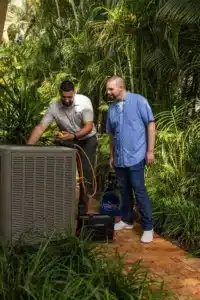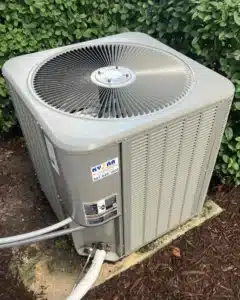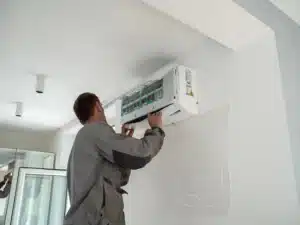Do Central Air Conditioners Recirculate Air or Bring in Fresh Air?
Many homeowners assume that central air conditioners pull fresh air...
Deciding whether to repair or replace your air conditioning system can feel overwhelming. After all, the Florida heat doesn’t give much room for error when it comes to cooling your home. Understanding the factors that influence this decision can help you make the best choice for your comfort and budget.
One of the first things to consider is the age of your current AC unit. Most air conditioning systems have a lifespan of about 10 to 15 years. If your unit is nearing or has surpassed this range, replacement might be the more cost-effective option. Older systems are more likely to break down and require frequent repairs, which can add up over time.
However, if your AC is only a few years old and generally in good condition, repairing it is often a smart decision. A newer unit is more likely to benefit from targeted repairs, extending its useful life and keeping it running efficiently.
Another important consideration is the cost of repairs. A general rule of thumb used by HVAC professionals is the 50% rule: If the cost of repairs is more than 50% of the cost of a new system, replacement is probably the better choice. Continually investing in an aging system can become a money pit.
For example, if your compressor fails or there’s a major refrigerant leak, the repair costs can be quite high. In these cases, replacing the entire system might make more sense, especially if your AC is older and less efficient. On the other hand, smaller issues like a broken fan motor or capacitor might be worth repairing if the system is relatively young and still efficient.
Energy efficiency is another key factor. Older AC units typically have lower SEER (Seasonal Energy Efficiency Ratio) ratings, which means they consume more electricity to cool your home. In Florida, where the AC runs almost year-round, an inefficient system can lead to sky-high energy bills.
Upgrading to a newer, energy-efficient model can lead to significant savings on your utility bills. The upfront cost of a replacement may seem steep, but the long-term benefits of lower energy consumption and reduced repair needs often outweigh the initial investment. Plus, modern AC units offer features like smart thermostats and variable-speed compressors, which can improve your home’s comfort and energy use.
Sometimes, it’s not just about money; it’s also about comfort. If your current AC system struggles to cool your home evenly or has difficulty keeping up during peak heat, a replacement might be in order. Uneven cooling, frequent cycling, or excessive noise are signs that your system is losing efficiency or is improperly sized for your home.
A new, properly installed unit can resolve these issues and improve your overall indoor comfort. When replacing your system, you can also consider upgrades that make your home more comfortable, such as zoning systems or advanced humidity controls, which are especially beneficial in Florida’s humid climate.
Environmental concerns are increasingly becoming part of the decision-making process. Older AC systems often use outdated refrigerants like R-22, which are harmful to the environment and have been phased out. If your AC uses R-22 and needs a refrigerant recharge, the cost will be higher, and replacement parts may become difficult to find.
Newer systems use eco-friendly refrigerants and are designed to meet modern environmental standards. By upgrading, you can reduce your home’s carbon footprint and contribute to a healthier planet while also saving on energy costs.
If you find yourself calling for AC repairs more than once or twice a season, it may be time to consider replacing your unit. Frequent breakdowns not only cause inconvenience but can also be a sign that your system is on its last legs. In Florida, an AC breakdown during the height of summer can be more than just uncomfortable—it can be a health concern, especially for vulnerable individuals.
Think about the stress and disruption caused by constant repairs. A new system provides peace of mind, knowing that your AC is reliable and less likely to fail when you need it most.
Many homeowners overlook the potential savings from incentives, rebates, or financing options when deciding to replace their AC. Manufacturers, utility companies, and even the government often offer financial incentives for upgrading to energy-efficient systems. These programs can significantly reduce the cost of a new installation.
In addition, many HVAC companies provide financing plans, making the initial cost of a new system more manageable. These options make replacement a more feasible choice for homeowners who are worried about the upfront expense.
The right choice between repairing or replacing your AC depends on a mix of factors, from the system’s age and repair history to your comfort needs and budget. Consulting with a trusted HVAC professional can provide you with a clearer picture of your options. They can assess your system and help you make an informed decision tailored to your home and lifestyle.
Ultimately, deciding whether to repair or replace your AC system is about finding a balance between cost, efficiency, and comfort. By carefully considering the factors discussed, you can choose the best option for your Florida home. Whether you opt for a quick repair or a brand-new system, investing in your home’s cooling will ensure you stay comfortable, even during the hottest days.

Many homeowners assume that central air conditioners pull fresh air...

Preventive AC maintenance plays a major role in keeping cooling...

Choosing the right air conditioning system for your home is...

Indoor air quality is a critical factor in maintaining a...

Maintaining clean and healthy indoor air is increasingly important, especially...

Maintaining the right level of humidity in your home can...